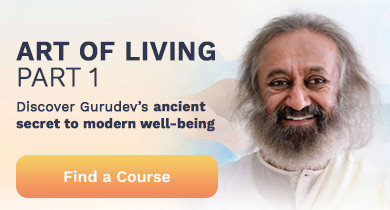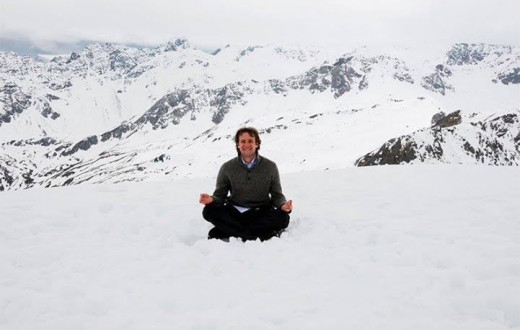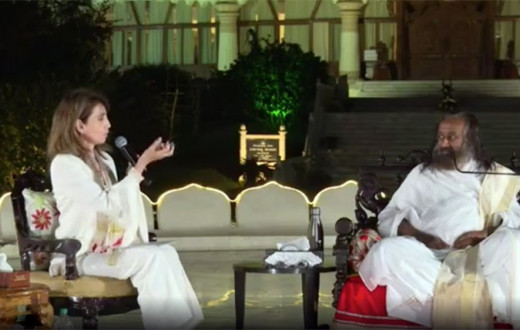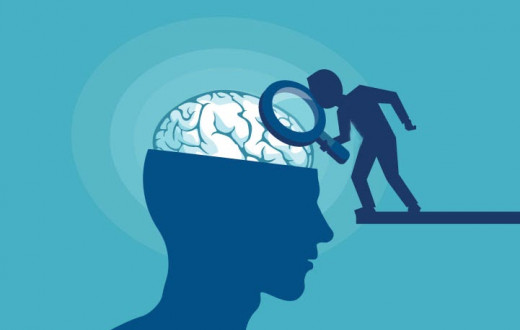Michael Fischman began his life as the son of an Orthodox Jewish Holocaust survivor in New York, and developed a successful career as a Madison Avenue advertising executive. Later through an unlikely turn of events, ended up as meditation student and teacher. He is also the author of a multi-award-winning memoir, “Stumbling Into Infinity: An Ordinary Man in the Sphere of Enlightenment”.
He talks with us about the joys of meditation, and the gift of writing.
Q-Tell us about your personal meditation journey?
Michael Fischman-I started to meditate when I was 26 years old. It was a rough patch in my life, and many of the social activities I was involved with at that time I have completely abandoned. I was living a very different lifestyle. A friend told me about meditation and it seemed to make sense. I gravitated to it very quickly. In 1988, after practicing for about a dozen years, I came to Gurudev Sri Sri Ravi Shankar and the Art of Living. It was a quantum leap forward in my practice. As opposed to spending a lot of time with a chattering mind in the first half of my meditation, the meditations were profoundly different. I would start my meditation in silence, and that was extremely valuable.
Q-You are a long-time teacher of meditation. Tells us about meditation in the Art of Living?
Michael Fischman-Meditation is a key part of the Art of Living, and Gurudev’s approach to meditation in the Art of Living is very unique. He takes a three-pronged approach. The first step is to help an individual quiet down their mind and their emotions with Sudarshan Kriya. This is the meditative rhythmic breathing practice that is taught on the Art of Living Part 1 course.
The second step is giving people instruction in the art of meditation through a course called Sahaj Samadhi Meditation. An individual is given a sound or mantra and taught how to use it, this gives them a deep experience on the basis of regular meditation. It cultures their system to maintain an inner peace and bliss that continues to grow inside.
The third approach is to give people a deep experience of silent awareness in a retreat program called the Art of Silence course. It allows people to spend four or five days in a retreat setting, away from responsibilities. The effect is like polishing the system, expanding awareness, and going very deeply into the experience of meditation and the experience of silence.
Q-How has your life changed since you learned meditation?
Michael Fischman-It is hard to say why my life has changed, whether it is due to meditation, to Sudarshan Kriya, the deep silence program, or due to interacting with Gurudev Sri Sri Ravi Shankar as a guru and teacher. Or maybe all of it.
I can say that the deep experience of peace and serenity that I get to experience twice a day definitely sets the tone & mood of my mind for the entire day. And that effect has grown through the years. Sudarshan Kriya helped me feel the effect of meditation more during the day.
Q-Do you think it is important to have teacher to learn meditation?
Michael Fischman-Yes, very much so. I don’t think you can learn it from book or from a seminar. People are blind to their own blind spots. You definitely need a teacher or a guru. The path of getting to the Self is a very interesting journey, and meditation is a key aspect of it. But unless you have the guidance & supervision of a Master, it would be difficult.
Q-A lot of Psychologists are using mindfulness and it has become quite mainstream. It has been taught by many people who aren’t enlightened masters. Do you think what they are doing is meditation?
Michael Fischman-There so many kinds of people on the planet and so many personalities with so many different patterns that the important thing is to meditate. It is great if you find a system what works for you. If you feel that you are going deep, if it is an effortless type of meditation, and the mind is experiencing stillness and expansion, then that is wonderful
Q-To people who have never experienced going deep, what does that mean?
Michael Fischman-I think even having that concept can cause problems for people meditating. Because you think “I need to go here”. The system takes what it needs during meditation. Some stress may need to be released at one point, some expansion may come. So every meditation is different and it is best not to try to repeat an experience you liked, but to be innocent and let it be a natural journey inward. Rather than give you my definition of what going deep means, I think it is best to say that meditation is a state of restful alertness. The mind is at peace and very much relaxed, just like when you are asleep, except that it is alert at the same time. That is the common experience of meditation.
Q-As a writer you have written this book Stumbling Into Infinity. How has meditation enhanced your writing abilities?
Michael Fischman-If I wasn’t meditating this book wouldn’t exist, because the book grew out of my experience with meditation. And meditation did give me the fuel to write.
When you are in a state of quiet stillness, that is when you are most creative. When you are worried, having problems, and there are negative emotions such as anger or jealousy, it is more of a challenge to be creative. Creativity blossoms out of being in the present moment, and that is what mediation is all about. It brings the mind into the present moment.
Q-How can budding writers make their writing more inspirational?
Michael Fischman-It is good to be vulnerable and personal, so the reader is engaged. Writing about what you know is really important. Just like in life, when you are writing, be yourself.
Q-Is it only important to write what others like, to write for others? Is it possible to write for only yourself?
Michael Fischman-That is like saying I enjoying singing and I sing a lot in the shower. That is a wonderful experience, but is that gift of having a wonderful voice just for you or also for the world? If we look at the talents that we have, our talents are there to share with others.
If you have physical beauty, it is not for you to admire yourself in the mirror. It is for other people to appreciate the beauty. If you have a talent in music or are a great singer or writer or you are creative with software design, then those gifts are to share with the world.
Whatever your talents, they are there for others.
Q-What was the reason for writing the book? What sort of experiences have people shared after reading your book?
Michael Fischman-I wrote Stumbling into Infinity because I feel like I had a very unique seat in a historic period of time.
Gurudev Sri Sri Ravi Shankar is transforming many individuals’ lives all around the world, and particularly here in India, where he is a great social revolutionary. I think he is one of the great spiritual masters of all time. I wanted to have the early period documented, to tell what it was like.
Many people may not have had the opportunity to interact in the same way I did. I wanted people to see the value of having an enlightened master and to know what an enlightened master is all about. And maybe benefit from what I went through. Sensitive people can also benefit from other people’s mistakes and experiences.
Many people who have read Stumbling into Infinity have shared with me that they could relate to a lot of the stories as though they were going through them. They felt as though Gurudev was talking directly to them.
Another thing is that when I wrote the book, I remembered a lot of the interactions and knowledge that Gurudev shared with me. I had transcribed a lot of the talks he gave at teacher training and advanced courses. That is the dialogue in the book. So it is actually Gurudev’s words. The readers are inspired because they feel that Gurudev is talking to them.
In a way, it is like a Gita, because the enlightened master is talking with the student and there is a dialog that runs throughout it. Not on every page, but that aspect was very much part of the plan in creating the book.
Q-You have been associated with the Art of Living's Corporate program, which is often taught in business and government settings. How do you think that meditation can contribute to the transformation of leadership qualities in a person?
Michael Fischman-If one is tense, irritable, frustrated or exhausted how can they be a good leader? A good leader means having a calm, clear mind, and being completely flexible. You can’t be rigid or closed to ideas. If Plan A doesn’t work, you need to be able to quickly jump to Plan B. If you are stuck in one paradigm and are not flexible and adjustable, you can’t lead. At the same time, you need to focus. You need to have access to inner strength, inner peace, and an inner rudder. The quality and state of mind of a leader is so critical.
Meditation and Sudarshan Kriya are essential for a person who is a leader. That doesn’t just mean corporate leadership. If you are a mother you are a leader, if you are a father you are a leader, if you are a student you are a leader. You are always in a position of leadership.
These spiritual practices are there to make better leaders in this world, and to make a better world.





























